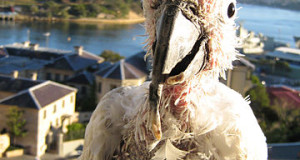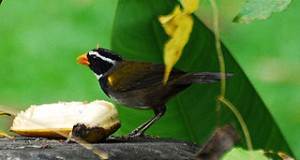People who breed canaries, shama thrushes and other noted songsters often comment that housing males within hearing distance of one another improves the quality of their songs. This theory has now been validated by researchers studying song sparrows (Melospiza melodia) at the University of Miami.
Typical and Improved Songs
 It seems that male song sparrows stick to their “usual” repertoire under normal circumstances – i.e. when calling to announce the ownership of their territory. However, when challenged by intruding males, song sparrows dramatically improve the quality of their songs, selecting note ranges and song speeds that are difficult to perform.
It seems that male song sparrows stick to their “usual” repertoire under normal circumstances – i.e. when calling to announce the ownership of their territory. However, when challenged by intruding males, song sparrows dramatically improve the quality of their songs, selecting note ranges and song speeds that are difficult to perform.
Whether this is to convince a female or male (or both) of the singer’s vigor has not yet been established, but clearly the birds are physically changing their songs in response to a hostile situation. This finding contradicts the long-held assumption that, once acquired, male birds’ song patterns are largely static.
Practical Applications
The song sparrow findings may eventually shed light on the acquisition of language in people, as similar brain pathways seem involved. Those of you who keep groups of canaries, green singing finches or other songbirds may wish to experiment a bit as well, to see if some competition spurs your pets to new musical heights.
Thoughts on the Song Sparrow
As for myself, the first time I hear a song sparrow call (whether the song is “improved” or not!) each late winter is a thrill, assuring me that warmer days are not far off. In years past, I heard these little fellows only near salt marshes, but am happy to report that they have now expanded into suburban yards and city parks in and near NYC.
Further Reading
You can hear a song sparrow’s call and read related field observations at
http://www.sitkanature.org/wordpress/2007/03/15/singing-song-sparrow/.
Please also see my article The Role of Learning and Instinct in Bird Song for more information on this and related topics.
Image referenced from Wikipedia and originally posted by Factumquintus
 That Bird Blog – Bird Care and History for Pet Birds
That Bird Blog – Bird Care and History for Pet Birds


